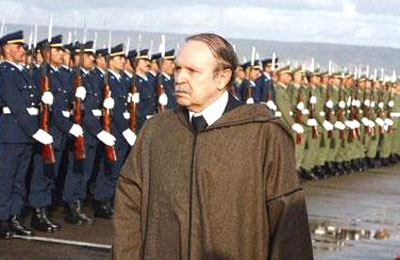
Algeria prepares for end of an era
Algiers, May 20, 2013
Three weeks after being rushed to hospital in Paris, Algerian President Abdelaziz Bouteflika has disappeared from sight, leaving behind a country preparing for a successor who for the first time will come from a generation too young to have fought in Algeria's war of independence against France.
In a country run with Soviet-style secrecy, nobody is sure how sick Bouteflika is. But despite an official bulletin last week saying he was recovering from a minor stroke, most believe the 76-year-old must be seriously ill to have disappeared from public view for so long.
France's Le Point magazine cited medical sources as saying some of his vital organs had been badly affected.
Algerian newspaper editor Hichem Aboud said that, according to his sources, Bouteflika - who survived cancer in 2005 - was in a deep coma.
French and Algerian officials declined comment but local media have hinted that the country is preparing for a new era.
The loss of Bouteflika would deprive Algeria of the last of the old guard who steered the country from
independence in 1962 through civil war against Islamist insurgents in the 1990s to a period of stability funded by vast oil and gas resources.
It would also lead to a bumpy transfer of power before presidential elections due in April 2014 at a time when Algeria's neighbours - among them Mali, Tunisia and Libya - are facing a revival of Islamist militancy in the region.
Algeria experienced that militancy in January when gunmen from Al Qaeda in the Islamic Maghreb (AQIM) attacked a gas plant in the south, killing 38 people, including foreign hostages.
But Bouteflika's passing would not plunge Africa's largest country into crisis.
A paternalistic state apparatus which includes a secretive military-intelligence establishment is trusted to manage the transition by a population too scarred by the 1990s to risk a return to conflict. Algeria also has $200 billion in foreign exchange reserves to buy off protesters if needed.
"Algeria is not based on individuals; it is based on institutions," said one Algerian security expert. "Algeria will be stable, even with Bouteflika gone."
NO UNREST
In the capital Algiers, a Mediterranean city whose elegant French-style apartment blocks with their white paint and blue shutters appear frozen in time, there is little sign of unrest despite anxieties about the president.
Nobody is even sure where Bouteflika is; some say he is still in France's Val-de-Grace military hospital; others that he has gone to Switzerland. Aboud, the newspaper editor, said he had already been brought back to Algeria.
"I don't think there will be instability. There are no actors who could lead such instability," he said. "And Algerians are also tired after 10 years of terrorism (in the 1990s).
Doctors and teachers have been striking to demand better pay and conditions in state health and education. Their demand, however, is not for an overthrow of the system, but for better management than that provided by the current gerontocracy.
And in Algeria, security forces have learned the lessons from the "Arab spring" protests which swept away dictators in Tunisia, Egypt and Libya: never antagonise the people.
Typical of that attitude was their response at a doctors' demonstration last week after an over-enthusiastic policeman had clamped the wheels of some illegally parked protesters' cars.
As irate white-coated doctors moved out in to the road, locking traffic, the clamps were quietly removed, leaving the 100-or-so protesters facing nothing more irksome than the unseasonable rain.
The state, say analysts, has learned from its failure to enlist the support of the population when in 1992 it cancelled elections Islamists were poised to win, triggering the civil war in which 200,000 people died. "You have to win the confidence of the population," said Anis Rahmani, owner of Ennahar television. "Everyone is scared of the people."
In towns in the vast desert south, the state has dealt with unemployment protests by hiring 6,000 policemen. That there is no need for so many was highlighted by a cartoon in the daily El Watan showing a gendarme on a traffic island signalling with his hands to an empty desert.
PREPARING THE GROUND
Algeria's ageing leaders have always conducted their affairs in secrecy, a legacy of their fear of betrayal during the 1954 to 1962 war of independence.
But in what appeared to be an effort to prepare the ground for a transfer of power, the Arabic-language El Khabar ran a front-page photo of Bouteflika on Saturday alongside a headline about the rarely mentioned Article 88 of the constitution under which the leader of the Senate would temporarily take over in the event of the death or incapacity of the president.
Others ran front-page photos of Prime Minister Abdelmalek Sellal - a 65-year-old tipped as a likely candidate in the presidential elections - promising economic development.
Born on March 2, 1937, Bouteflika was a protege of Houari Boumedienne, an icon of the independence war who would later become president. As foreign minister in the 1960s, Bouteflika championed the Non-Aligned Movement, and welcomed among others Cuban revolutionary Che Guevara to Algeria.
First elected president in 1999, Bouteflika ended the civil war, offering an amnesty to militants who laid down their arms. He won re-election in 2004 and 2009, wresting power from the military through a series of behind-the-scenes battles.
But over the past few years, his age and poor health caught up with him. In a speech in Setif, eastern Algeria, in May 2012, a frail Bouteflika said it was time for his generation to hand over to new leaders. "For us, it's over," he said. - Reuters







